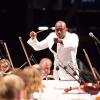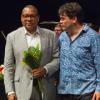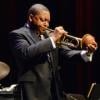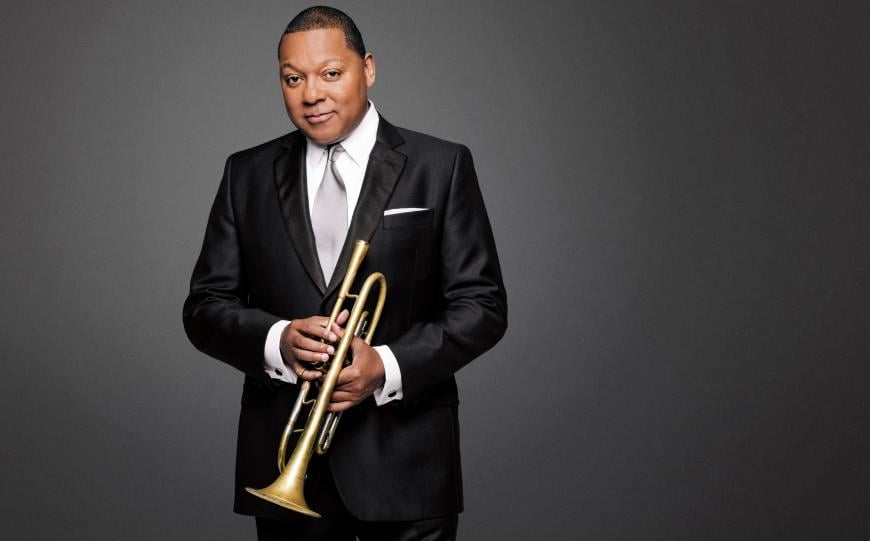
You’ve heard of the cliche “everything but the kitchen sink”? That pretty much describes Wynton Marsalis’s sprawling, 112-minute orchestral/choral/big band/small-group extravaganza All Rise. I thought so when I first heard it in 2001 at the Hollywood Bowl in what was only its third presentation — and first on the West Coast — and the piece’s return to the Bowl Thursday night (Sept. 8) only magnified that impression. As for its place and meaning in Marsalis’s ever-burgeoning catalog of work, that’s changed.
All Rise was the culmination of a tumultuous year in Marsalis’s career (1999), in which, by his own admission, he was busy every single day — releasing no fewer than 15 CDs, churning out new arrangements of Duke Ellington’s extended works for that musician’s centennial, producing a ballet, and finally, composing All Rise, the most massively scaled thing he had written up to that point. This in addition to touring with the Jazz at Lincoln Center Orchestra (JLCO) and plenty of other projects. That is a crazy pace, even for a workaholic like Marsalis.
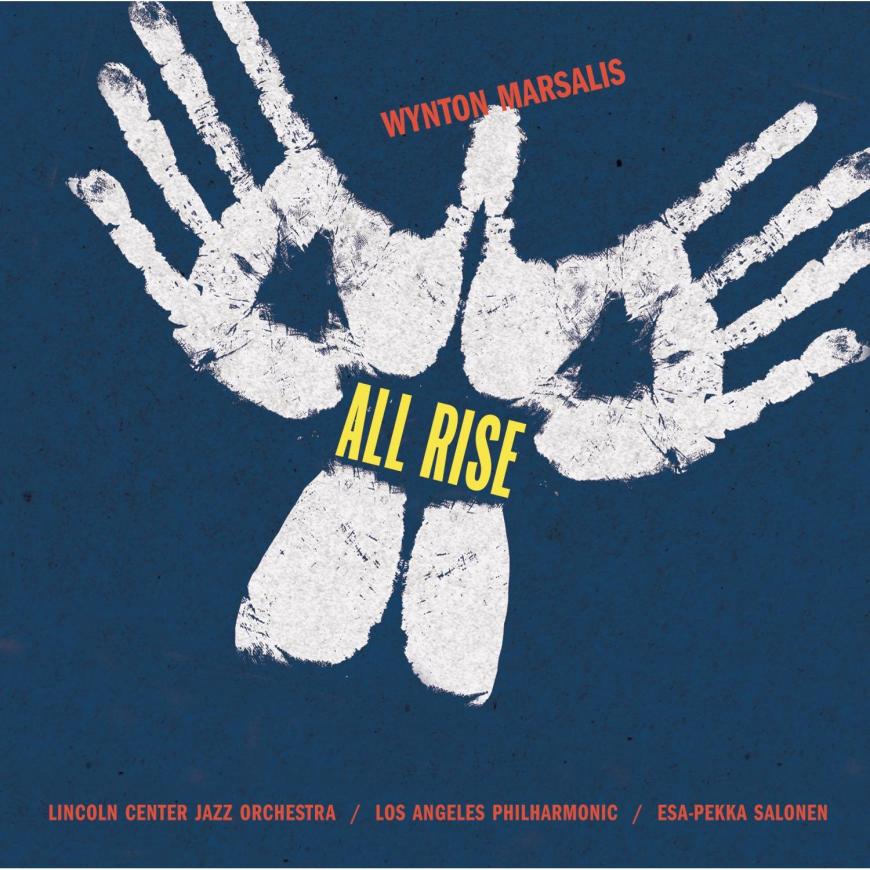
All Rise is now considered Marsalis’s Symphony No. 1, the precursor to his other big eclectic works in the 21st century like Blues Symphony (Symphony No. 2), Swing Symphony (Symphony No. 3), and The Jungle (Symphony No. 4). The New York Philharmonic gave the first performance of All Rise at the end of 1999, and everything was ready to roll for the Los Angeles Philharmonic/JLCO performance led by then-Music Director Esa-Pekka Salonen at the Bowl in 2001, with a recording to follow.
It almost got scuttled, for two days before the performance, 9/11 happened. But the consensus among the musicians was to “stay and play” — and as a result, All Rise took on new meanings of despair and uplift that perhaps even the composer could not have planned. A passage in the fifth movement where the chorus shouts “Comfort me, comfort me / Save us, O Lord” with the wild braying of plunger-muted Ellingtonian brass hit too close to home so soon after the immolation of the World Trade Center.
Some thought that the work would be forever associated with 9/11. But 21 years have passed. 9/11 has faded in memory, the associations muted among new generations. All Rise has gone on to evoke the emotions of other events, such as in a performance in Tulsa in 2021 that observed the anniversary of the 1921 Tulsa Race Massacre. There was a momentous historical event lurking in the background of Thursday’s performance as well — the passing of Queen Elizabeth II that day after 70 years on the throne — but there was far less resonance in the music this time.
Cast in 12 movements, grouped in three sections of four movements each — a deliberate salute to the 12-bar blues structure — All Rise seems more than ever like the exuberant work of an eager, omnivorous graduate student trying to throw everything he knows into one pot. In that context, Duke Ellington takes the role of Marsalis’s most beloved professor and faculty advisor, for Ellington’s harmonies and plunger-mute effects are constantly on the prowl.
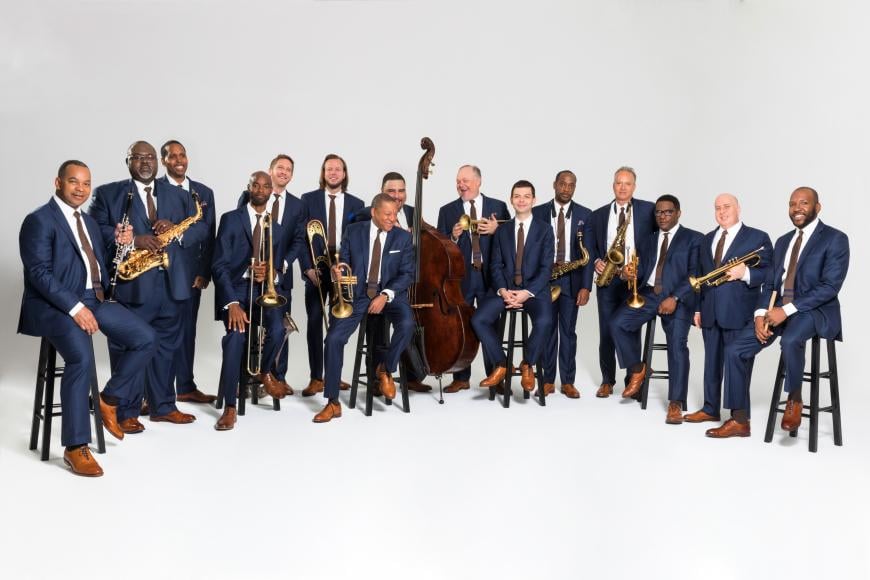
Charles Mingus was another of Marsalis’s “professors,” and so was Gil Evans. All Rise ventures into Afro-Cuban rhythms, Argentinian tango, country fiddling, and American gospel with echoes of passages from Porgy and Bess. Marsalis throws in paraphrases of Bach, Gabrieli brass, Hindemith, Tchaikovsky, and a lot of neoclassical Stravinsky. He even tries to write a fugue for strings in Part IV, a stillborn thing that goes nowhere; he would get a courtesy C-plus on that for the courage to give it a go.
Through all of this rampant eclecticism, do we hear a perceivable voice that can only belong to Wynton Marsalis? I think so, mainly as an extension of Ellington, to be sure, but with combinations of colors that build on the Ellington platform in their own ways. Marsalis also brings to this piece his own brand of showbiz savvy; after the earnest appeals of the chorus in the final section for all to rise, he closes the huge work with a joyous New Orleans Dixieland send-off per his many past handkerchief-waving finales at the Bowl.
Yet after all this effort and obvious mastery of most of the elements that make up this piece, it’s hard to recall a single strand of notes that stick in the memory — which is also characteristic of Marsalis’s music. One wonders if he would trade everything he does here for a single chorus of “Satin Doll” or “Mood Indigo” or Billy Strayhorn’s “Raincheck.”
All Rise holds together more tightly on the 2001 Sony recording than it did in this return performance, the disparate elements threatening to spin off on their own. Yet there were plenty of passages that struck individual sparks, particularly when the big band was involved. The sections that came off best were the Latin-ish Part IX and especially the loosey-goosey train groove of Part X — kind of a sequel to Marsalis’s own suite Big Train, as well as the Duke’s journeys down those tracks. And yes, the New Orleans coda, too.
All of this was done on three rehearsals (unusual for the Bowl, which generally allows only one), with close to 200 performers — including the LA Phil, the Jazz at Lincoln Center Orchestra, and members of five choruses — fitting pretty comfortably on the Bowl’s huge stage. James Gaffigan officiated on the podium, easily moving to the grooves, and the Los Angeles Master Chorale’s Grant Gershon was onstage toward the rear of the shell directing the choruses.
Marsalis as usual kept himself bolted inconspicuously to a chair in the trumpet section of the JLCO. But when he burst forth with his designated impassioned solo in Part V — playing more on the outside than in any previous appearance that I recall — he showed yet again his true greatness as a trumpeter in a live situation.


